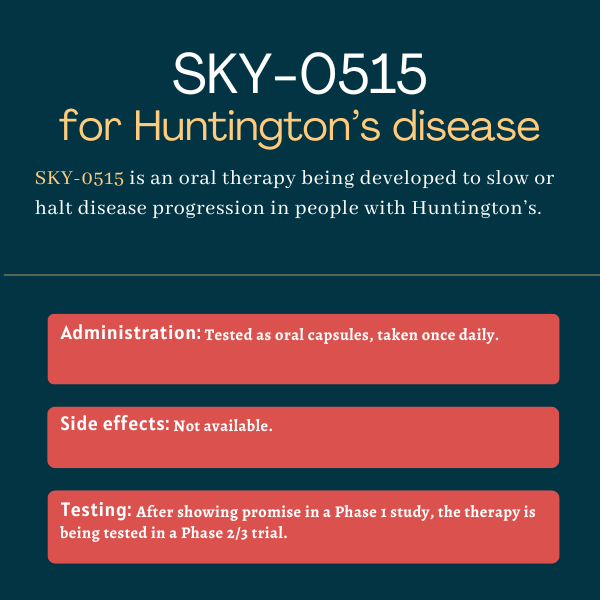 Discussion
Discussion
SKY-0515 for Huntington’s disease
Last updated July 15, 2025, by Andrea Lobo, PhD

What is SKY-0515 for Huntington’s disease?
SKY-0515 is an experimental oral therapy that is being developed by Skyhawk Therapeutics to slow or halt disease progression in people with Huntington’s disease.
Huntington’s is caused by a defect in the HTT gene that consists of excessive CAG repeats, a series of three DNA building blocks. This results in the production of an abnormally long huntingtin protein that forms toxic clumps in nerve cells, ultimately causing a range of symptoms, including motor, cognitive, and behavioral issues, that progress over time.
Notably, CAG repeats can progressively lengthen over time, a process called somatic CAG repeat expansion, with longer repeats associated with earlier onset and more severe disease.
SKY-0515 is designed to reduce the production of mutant and healthy forms of the huntingtin protein, as well as PMS1, a DNA-repair protein involved in somatic CAG repeat expansion. This is expected to reduce the formation of toxic huntingtin clumps, and slow or halt Huntington’s progression.
Therapy snapshot
| Treatment name: | SKY-0515 |
| Administration: | Oral capsules |
| Clinical testing: | Currently in a Phase 2/3 trial |
How will SKY-0515 be administered?
Several doses of SKY-0515, taken once daily, have been tested in Huntington’s clinical trials. A Phase 1 trial’s sub-study is testing 3 mg and 9 mg oral capsules of the therapy, while a Phase 2/3 trial is testing three doses (not disclosed to date).

SKY-0515 in clinical trials
The safety, tolerability, and pharmacological properties of single or repeated ascending doses of SKY-0515 were assessed against a placebo in healthy adults within a Phase 1 trial (ACTRN12623001161617). Results demonstrated that SKY-0515, tested at doses ranging from 1 mg to 16 mg, had a favorable safety and tolerability profile and reduced huntingtin levels by up to 72% in a dose-dependent manner.
A Phase 1 trial’s sub-study (ACTRN12624000602527) is testing SKY-0515 at two dose levels (3 and 9 mg) against a placebo in up to 50 adults with Huntington’s. The treatment is being administered once daily for about three months.
Subsequently, Skyhawk launched the Phase 2/3 FALCON-HD trial (NCT06873334) to assess SKY-0515’s safety, efficacy, and pharmacological properties in up to 120 adults, ages 25 and older, with stage 2 and early stage 3 Huntington’s, marked by impairments to daily activities and further symptom worsening. Participants are randomly assigned to receive either one of three SKY-0515 doses or a placebo for a year.
Two of FALCON-HD’s main goals are to assess changes in the blood levels of mutant huntingtin and PMS1, as well as in brain volume assessed by MRI. The other main goal includes changes in the Unified Huntington’s Disease Rating Scale, a validated tool to evaluate movement, cognitive skills, behavior, and functional independence in people with Huntington’s.
The first patient was dosed in June 2025 and the study is set to end in 2027.
SKY-0515 side effects
To date, Skyhawk has released no information regarding the treatment’s potential side effects in healthy volunteers or people with Huntington’s.
Huntington’s Disease News is strictly a news and information website about the disease. It does not provide medical advice, diagnosis or treatment. This content is not intended to be a substitute for professional medical advice, diagnosis, or treatment. Always seek the advice of your physician or other qualified health provider with any questions you may have regarding a medical condition. Never disregard professional medical advice or delay in seeking it because of something you have read on this website.
Recent Posts
- The challenges of navigating dating while living with Huntington’s disease
- Guest Voice: I hate Huntington’s disease, but I love my husband
- New Zealand OKs Phase 1 trial of Huntington’s therapy SRP-1005
- Nothing compares to a punny Valentine’s Day play
- It’s OK to reach out for help during the February slump
- Huntington’s treatment safely slows disease over 9 months in early trial
- A new puppy gives my gene-positive wife a sense of purpose
- Toward a better understanding of anger as a symptom of Huntington’s disease
- Actor Will Forte shares family story in Teva awareness campaign
- Finding ‘space in the middle’ to deal with life’s challenges
Related articles
-
 Discussion
Discussion
-
-



